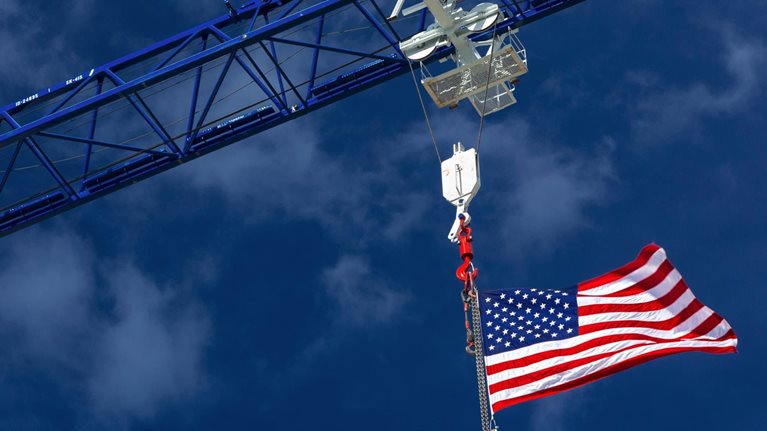Imagine for a moment the way the world will look in the near future when technological advancements finally make possible many of the artificial-intelligence and advanced manufacturing capabilities that we keep hearing are just around the corner. Do you see exciting opportunities enhancing your ability to improve your productivity and economic standing? Or do you see menacing setbacks with more and more workers, including yourself, rendered obsolete and prospects for building better lives increasingly stymied?
Research conducted in June by Burson-Marsteller and the polling firm PSB strongly indicates that the future Americans envision when it comes to technology’s impact on economic potential is closely linked to their education level. The divide between those Americans who have high-school diplomas or less and those who have college degrees or more is especially dramatic. The findings show that an American’s education level influences how he or she views the impact technological advancements will have on their own success and the skills they will need to thrive in the revolutionary economic landscape coming quickly into view. Even more than household income, geography, and political-party affiliation, education informs the divide between Americans and their view of the future on many issues related to the role of technology in a changing economy.
More college-educated Americans say they are optimistic about their own futures than those with a high-school diploma or less (72 percent and 66 percent, respectively). There are even deeper divides in how Americans view their own readiness to meet new demands and seize new opportunities. Only 42 percent of Americans with a high-school diploma or less say they have the right skills to succeed in the 21st century. That is striking compared with the 71 percent of Americans who have college degrees or more and are confident about their skills.
When asked whether they have the skills to succeed, Americans with a high-school diploma or less are nearly twice as likely as those with college degrees or more to say they do not know (27 percent and 15 percent, respectively). Thirty-three percent of them are unsure whether they will be laid off in the next five years, and 19 percent of them say they do not know if a machine could take their job in the next five years.
Stay current on your favorite topics
Given these uncertainties, it should not be surprising that less-educated Americans are also more likely to agree with more pessimistic views of the US economy’s future (Exhibit 1). Americans with a high-school education or less are 50 percent more likely to say they are scared about that future (18 percent high school or less; 12 percent college or more). They are nearly twice as likely to say they are confused or overwhelmed (9 percent high school or less; 5 percent college or more).

Fifty-five percent of Americans with a college degree or more say technology will make overall employment better, compared with 45 percent of those with a high-school diploma or less. This overall tone is clear, as well, when Americans respond to questions about opportunities in specific industries. Americans with college degrees say advanced sectors, including high tech, healthcare, and renewable energy or green technologies will create the most jobs in the next five years (48 percent, 40 percent, and 35 percent, respectively). Americans with high-school diplomas or less also rank these industries high, but they are not nearly as bullish. Only 37 percent of these Americans identified high tech as the leading industry for job creation, with 33 percent and 28 percent, respectively, for healthcare and renewables or green technologies.
Meanwhile, the less-educated respondents tend to see opportunity in older lines of work. Americans with high-school diplomas or less are three times as likely as college graduates to say retail will create the most jobs (15 percent versus 5 percent). They are half as hopeful that financial services will create new jobs (5 percent for Americans with a high-school diploma or less versus 10 percent for college degrees or more).
Americans definitely have divergent views on the most important skills for success in future US-based manufacturing jobs (Exhibit 2). For example, Americans with at least a college degree are significantly more likely to identify reading comprehension and critical thinking as an important skill (23 percent) compared with 13 percent of Americans with high-school diplomas or less.

Meanwhile, Americans with high-school diplomas or less tend to focus on more technically oriented abilities. They say skills related to equipment maintenance and repair will be important a third more often than Americans with at least a college degree. And Americans with less education are more uncertain overall about the skills they will need in the future (13 percent compared with 6 percent for Americans with college degrees or more), reflecting deeper anxieties about changes in the economy.
There is room for agreement. Mechanical and electrical engineering were ranked as top skills for both groups; 40 percent of Americans with high-school diplomas or less and 35 percent of Americans with at least a college degree say those skills will be in demand.
Despite their differing views on many fronts, Americans are consistent in the help they think they will need as they move into this world of advanced manufacturing and increasingly automated work. They tend to agree that there is a role for both the public and private sector, working together where possible, to help prepare the workforce and, in doing so, to promote economic growth. At the same time, people see limitations on the roles both government and the private sector can play.
Americans of all education levels agree that government should play a major role in strengthening the economy (57 percent) and that it should put a priority on protecting workers (63 percent) instead of helping companies grow (37 percent) . Helping to protect workers can come through tax incentives for companies, according to most Americans. Eighty-six percent of Americans support tax credits for companies that pay for training workers in more modern skills.

Making it in America
As has been seen in numerous surveys in recent years, the corporate sector has serious reputational issues to address. In this survey, large companies are seen as caring more about profit (88 percent) than individuals (12 percent), and 61 percent of Americans have an unfavorable view of business executives. Yet, while corporations and their leaders may be distrusted, they still fare better than government: 59 percent of respondents say companies have a more positive impact on them than the federal government does.
Despite their different perspectives, especially those based on education level, the American people are still united in their hopes for solutions to the challenges new technologies pose for them as workers in a fast-changing, unpredictable economy. The solutions they hope to find, based on this most recent survey, lie in the ability of the public and private sectors to come together to help provide training and other opportunities to embrace change instead of being daunted by it. No matter the education level, Americans agree: if they have the help from the combined efforts of government and business, they can still make it in America.

